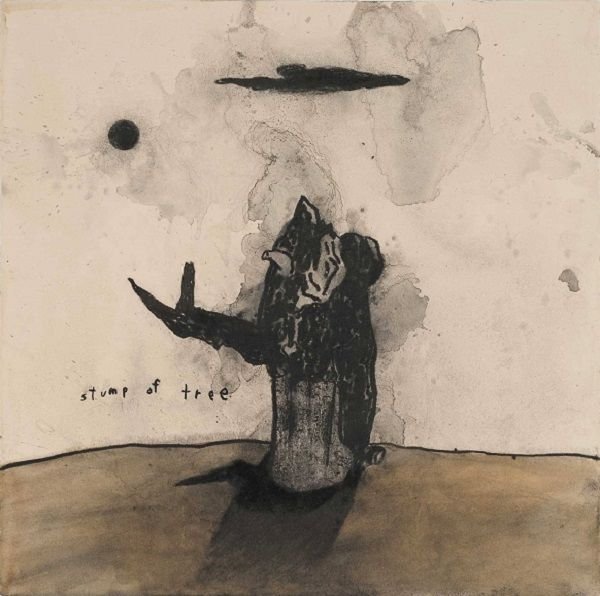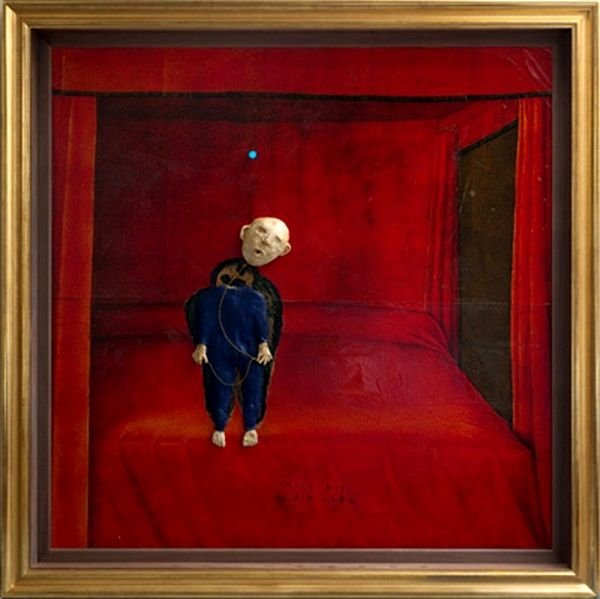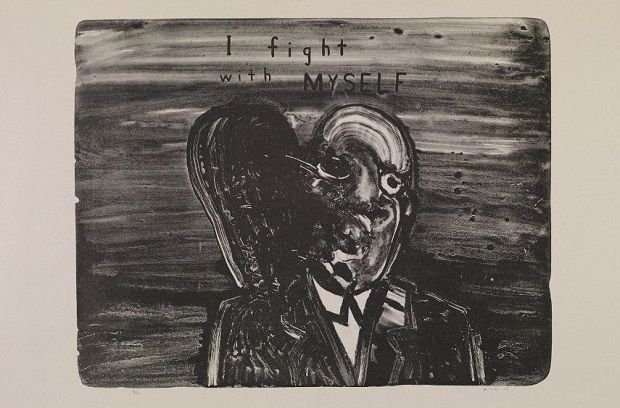David Lynch a few years ago said that movies would not do anymore, which made many fans hurt. He started with music and he described it as a modern blues. In his music, Lynch does not deviate sharply from the stylistics found in his other artistic endeavors - painting, photography and cinema. (In the sense that if his films look like chaotic dreams, it sounds like his music - like a sleeping soundtrack, listening to a neighboring room.) The Big Dream is an electronic mix of sample and voices, the most - a hypnotic collaboration with Swedish pop singer Lucky Li. The whole album brings the memory of the Twin Peaks music themes.

David Lynch The Art Life - Painting
As the short-lived noise around this project subsided, I decided that my beloved director had isolated himself somewhere in the mountains to meditate and that I would not see more of him. But then, in the summer of 2015, Facebook first told me they were starting the shootings of the third season at Twin Peaks. Now, the only important question is: Can Lync, in 25 years, be able to take a dignified continuation of one of the most exciting series? "David Lynch's Art of Life" is Lynch himself, telling about his childhood and his early 20s. His reflection is focused on his longest-lasting passion-painting. No one introduces Lynch, he does it in his typical style - he speaks slowly, he thinks, with long pauses between the words. It seems to me a brilliant idea of a documentary project about Lynch (especially at this moment of breath) to focus on the most unknown period of his life - the childhood and youth years before he got involved with cinema. Even more curious is the approach of director John Nguyen (this is his second documentary about Lynch, after Lynch, 2007) to show the artist before the director; to teach the viewer the path Lynch had come to before he became one we know him (only a clue: his first feature-length "Rubber Head" is one of Stanley Kubrick's favorites). The documentary was an absolute pleasure for me. Though if you ask the man sitting on two seats to the left: "This old man has completely unraveled what new Twin Peaks will do!" Interesting when the Twin Peaks was a standard for "normality." The film is a portrait of Lynch (the boy, the rebel, the loner), painted by himself. Lynch begins his narrative claiming that the artist's past is stealing into the future. This is also a starting point for the meaning of the film - the creator can not be isolated from the environment in which he grew up, from his surroundings, from the key events of life - the birth of his first child (Lynch happens when he is 21) , the telephone conversation telling him that he was accepted to study at the American Film Institute, his subsequent divorce with Peggy Lynch, and so on.

Stump of Tree, 2013. by David Lycnh
Lynch grew up in the 50s in a happy family - mother and father, who are perfectly understood ("I have never heard them quarrel once, living in absolute harmony."), Financially secured. Describes her mother as a religious woman, but does not impose her religion, devoted but not suffocating in her love. His father is a biologist, he works with the Ministry of Agriculture and travels a lot. Just before the age of fourteen, Lynch changed homes in several states - Montana, Idaho, Washington, and finally moved his family further to the eastern state of Virginia. And despite the nomadic childhood, the child's world David stretches between a few blocks. "My world was very, very small," he bangs, "but when your world is so small, it all comes in." Grows without many friends, strives for isolation to give him free time to paint . She constantly scratches in her school books and notebooks. He hates from a small school, in his words with a strong, passionate hatred. When Lynch moved to Virginia (he lived only in mountainous little northeastern towns, where he was tweaked and the look of Twin Peaks), David falls into a gloomy state of mind. He makes friends with inappropriate people, bad guys (he says no drugs are involved), wasting his time on the streets, absent from school, acting with his parents, and so on. The only thing he likes is the painting he does not even suspect that he can be a real profession.

Photo from the movie David Lynch: The Art Life
From a small figure he realizes that his drawings do not happen. But what motivates him to continue is the absolute freedom to fill your studio with whatever you want - "I knew I was not painting well. But I also knew that if I paint a lot, I can create something important to myself. " "Sleep has a key place in my life." And whether it dreams from dreams themselves, or from the imagination that transforms reality into sleep, is a controversial issue. Listening to him as he talks about his life, I think Lynch's mind is focused on seeking the strange and unusual, just where another would see beating and normality. If David's childhood had stretched between a few streets, he had to invent heroes and events to overflow and continue these streets. When he heard the brakes of a car, hiding behind a freshly painted fence, he had not imagined that the ordinary milkman came with ordinary milk, imagined the White-faced Man who had the ability to penetrate into your house and be in two places at the same time. The red roses from the neighboring yard always grow only in the bright blue sky. The coffee should be black (blacker than the moonless night) and depending on where you drink it from the liquid state, it must be firm. Adult words are sometimes deprived of any meaning and therefore do not necessarily follow grammatical rules, they break with them to emphasize their futility. Babies are far less innocent and pleasant beings, they are actually real monsters who have the power to get the parent. In short: the world is often abnormal, the reality is flexible. And childhood shapes the creativity of the adult.

David Lynch — Between Two Worlds
One night, David plays with friends on the street. A brilliant female figure appears from the distance. The whiteness of her naked body, contrasting with the night, shook the boy. "For the first time I saw a naked woman." Such a vision can not be forgotten, but it also raises the question of whether it was real or the result of a imagination. Lynch from a small girl has been involved with girls. Already on 14-15 he had a girlfriend. Women are early. It is divorced early. He is currently married for the fourth time. The female company for him is obviously essential. Is this naked woman not the first in love, in the dream or in what he had, his first touch with the otherness and the mystery of the female sex? Many of his films ("Blue Velvet", "Lost Highway", "Mulholland Drive") make it a good idea to give a positive answer to this assumption. He also said unequivocally: "When I was young, I thought that only two things matter - painting and women." Above all, David Lynch's Art of Life is a film shot to show Lynch as a freelancer and totally committed artist. He has never been subjected to the limitations imposed on him by the public (for example the institution of the school, the employers with whom he quickly ends links), nor those who have imposed on him his friends artists who disagree with his style. (Sam admits that his creative development is largely luck.) Absolutely recognizable in his style both as a director and as an artist. When I watched and listened to him, I was admired for having kept himself, not being ashamed and afraid of him, to look the way the child looks - always looking for surprise.
Adore Lynch! Unique! ❤️
Yes, not so many artist like him this days :(
Great post about a great man, who is still out there doing in your face art. Bravo... We love you David, keep going deep into the depths to get the real big ideas...
Cheers!
Un superbe article comme d'habitude et qui est très passionnant, mais je trouve cela dommage que tu n'as pas assez de popularité tu mérites 100 fois mieux mon ami, j'attends avec impatiente ton prochain article porte toi bien ;)
Thanks :)
He is truly a master filmaker. That episode 8 of the third season of Twin Peaks is a mark of surreal excellence. One of the best cinematic experiencies of 2017. This doc is the perfect dessert after that fest.
Yes i am agree with you!
Dreams often reflect people's thoughts. They are a reflection of their dreams and searches in life.
Very true :)